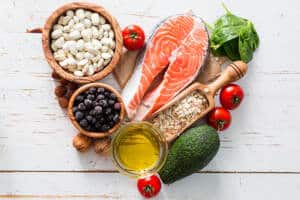15 Foods to Fight Heart Disease
In February, we highlight the importance of heart health. Your heart is important; it pumps blood throughout your body to your organs and back. Eating habits, exercise and other lifestyle choices affect the overall health of your heart.

Understanding Your Food
Nutrition is important to understand so that you are fueling your body properly. Certain minerals and substances are good for your heart, such as antioxidants, cholesterol, minerals and more. Antioxidants help defend your cells from damage caused by potentially harmful molecules known as free radicals (Healthline). They can be found in fruits and vegetables. Cholesterol is a waxy substance that is in all the cells in your body. It is needed for your body to make hormones, vitamin D, and other substances that help with digestion. However, too much cholesterol is bad. Some foods are high in saturated fats and trans fats, which is added as “bad” cholesterol to your body. When this happens, it increases your risk of heart disease or stroke. Vitamins and minerals help your body in many ways, including reducing unhealthy cholesterol levels and promoting blood clotting.
15 Foods to Fight Heart Disease
1. Leafy Greens
Leafy green vegetables such as spinach, kale and collard greens have many vitamins, minerals and antioxidants. They are especially rich in vitamin K, a vitamin that protects your arteries and promotes proper blood clotting. Leafy green vegetables are also high in dietary nitrates, which can reduce blood pressure and strengthen the cells that line blood vessels.
2. Whole Grains
Whole grains are higher in fiber, which can help reduce “bad” LDL cholesterol and decrease the risk of heart disease.
3. Berries
Strawberries, blueberries, blackberries and raspberries have important nutrients that are important to heart health. Berries are rich in antioxidants, which protect against the development of heart disease.
4. Avocados
Avocados are a great source of healthy fats, which may reduce levels of “bad” cholesterol and a lower risk of heart disease.
5. Fatty Fish and Fish Oil
Fatty fish like salmon, mackerel, sardines and tuna are loaded with omega-3 fatty acids, which have great heart-health benefits. They increase the amount of good cholesterol, decrease blood pressure, reduce blood clots and plaque buildup, and more.
6. Walnuts
Walnuts are a great source of fiber and micronutrients like magnesium, copper and manganese. Eating walnuts can reduce “bad” cholesterol, lower blood pressure and decrease inflammation.
7. Beans
Beans contain resistant starch, improve heart health by decreasing blood levels of triglycerides and “bad” cholesterol. They are also a good source of fiber.
8. Dark Chocolate
Dark chocolate is rich in antioxidants, which can help boost heart health.
9. Tomatoes
Tomatoes have lycopene, a natural plant pigment with antioxidant properties.
10. Almonds
Almonds have many vitamins and minerals that are important for heart health. They are also a good source of heart-healthy fats and fiber, which help protect against heart disease.
11. Seeds
Chia seeds, flaxseeds and hemp seeds are all sources of important nutrients, including fiber and omega-3 fatty acids.
12. Garlic
Research has shown garlic can help improve heart health. It can decrease platelet buildup, which may reduce the risk of blood clots and stroke.
13. Olive Oil
Olive oil has many antioxidants, which can relieve inflammation and decrease the risk of diseases.
14. Edamame
Edamame is a type of soybean frequently found in Asian cuisine. It is rich in soy isoflavones, which may help lower “bad” cholesterol levels and improve heart health.
15. Green Tea
Green tea has been associated with many health benefits. It is full of polyphenols and catechins, which act as antioxidants to prevent cell damage, reduce inflammation and protect the health of your heart. (Healthline)

While eating heart-healthy foods is great, exercise and good habits also play a role in your health. This month, focus on making healthy habits. Try walking every day, drinking more water, or kicking your bad habit. As always, speak to your healthcare provider about other ways to keep your heart in-shape and ask about your risk of heart disease. If it’s time for your annual check-up, be sure to call AxessPointe today to schedule an appointment at 888-975-9188.
References
https://www.healthline.com/nutrition/foods-high-in-antioxidants
https://www.healthline.com/nutrition/heart-healthy-foods#TOC_TITLE_HDR_16


